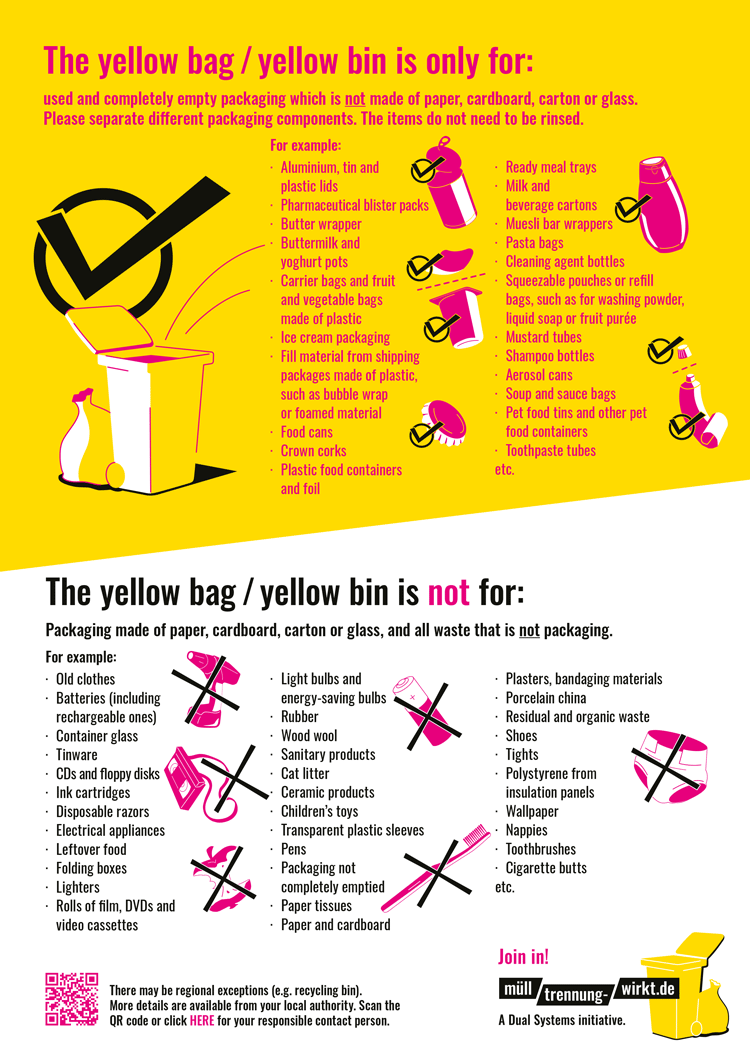
We’re part of the Mülltrennung wirkt campaign
As a dual system, we’re a member of the information campaign Mülltrennung wirkt – sorting waste works – which aims to educate and inform the German public about recycling. The primary objectives are to improve the quality of the plastic, metal and composite packaging waste disposed of in yellow bins and yellow bags, and to increase the quantity collected. The same goes for the collection of used glass, paper, paperboard and cardboard. The goal is to increase the amount of reusable material in the recycling loop – to protect the climate and conserve resources.
What is the role of the dual systems?
In Germany, dual systems such as Noventiz Dual organise the nationwide collection, sorting and recovery of used sales packaging for industry and commerce. Manufacturers and retailers report the amount and type of sales packaging they place on the market and pay participation fees (also known as licence fees) to the dual system they’ve chosen. The latest version of the German Packaging Act defines the tasks of the dual systems. Get your packaging licence in just a few clicks here.
Climate action starts here. With you. Join us.
How to sort waste properly
With the campaign “Climate action starts here. With you. Join us” consumers are being educated on how to sort waste properly and why it matters. It is still too common for non-recyclable waste to be disposed of in yellow bins and bags, which makes it difficult – or even impossible – to recycle packaging. Meanwhile, reusable materials thrown away as non-recyclable waste are lost. The campaign aims to change this by encouraging consumers to take action. Packaging can only be recycled if it is sorted and disposed of properly.
Explanatory lists can help people sort their waste: The Mülltrennung wirkt campaign has compiled lists in different languages that can be downloaded and printed.

Recycling starts with packaging design
Environmentally conscious consumers are demanding packaging that is highly recyclable, and the German Packaging Act (VerpackG) provides for this. Producers need to think about the recyclability of their packaging.
With rotate, our recognised test method based on the applicable minimum standard set by the Central Agency Packaging Register, we can assess your packaging for recyclability and advise companies on how to design more recyclable packaging right from the outset.
Would you like to know more about our assessment method?
Together for a sustainable future
Help us make a real difference for the benefit of the environment.
Questions and answers
Preventing the pollution of the environment and the oceans
Waste that is released into nature poses dangers to small animals and plants, especially through the harmful effects of microplastic particles and other pollutants. Our oceans are particularly susceptible to environmental damage, with plastic making up three quarters of all waste poured into the sea. Thousands of animals, including fish, whales, dolphins and seabirds, die as a result of entanglement in rubbish, asphyxiation in plastic bags, or mistaking waste for food. Plastic takes hundreds or even thousands of years to decompose. At most, it only breaks down into smaller, insoluble particles and microplastics. Once in the ocean, microplastics are ingested by marine creatures and, through the food chain, eventually make their way into the human body. The impact of inadequately disposed (plastic) waste has catastrophic consequences for the environment.
Properly discarded packaging at home seldom finds its way into nature or the oceans. On the contrary: Having been separated by the consumers, packaging is sorted according to material type using cutting-edge sorting machines and is then sent to dedicated recycling and recovery plants. This process safeguards the environment and conserves valuable raw materials.
Every year, between 4.8 and 12.7 tonnes of plastic are poured into our oceans. This plastic waste does not solely originate from the shipping and fishing industries, but a significant proportion is swept into the oceans by rivers, or carried by the wind. Especially waste from countries with inadequate waste collection and disposal ends up in the environment. Ninety percent of the plastic waste found in the oceans has been transported by one of ten rivers, eight of which are in Asia with the remaining two being the Nile and the Niger. Among these, the largest amounts of plastic waste are transported by four rivers, namely the Yellow River (China), the Yangtze (China), the Mekong River (Vietnam) and the Ganges (India). But despite its effective collection and recycling system for private households, Germany still has a major problem with littering. Disposable plastic packaging, such as takeaway coffee cups, is a particular problem. To protect the environment, it’s best to take this sort of packaging home to dispose of it adequately. This ensures that used packaging can remain in the material life cycle and serve as a basis for producing new packaging.
The German Packaging Act ensures that Germany has a proficient collection and recycling system for packaging waste, which is implemented by the dual systems. The Packaging Act obliges packaging producers to contribute towards the cost of collecting, disposing and recovering packaging, and sets high recycling rates. Moreover, to prevent our environment and oceans from getting swamped with ever more plastic, disposable plastic products have been banned since 3 July 2021. These products include:
- Takeaway cups made of expanded polystyrene (Styrofoam)
- Disposable cutlery and plates, including those made of “bioplastics” and paperboard (with plastic content or coated)
- Fast food packaging
- Drinking straws
- Stirrers and cotton swabs
In the next few years, additional regulations will come into force. For instance, from 2023, catering businesses, food delivery services and restaurants must provide customers with reusable containers as an option for takeaway food and beverages that does not cost customers more than disposable solutions.
The German government is also working at an international level to reduce plastic waste and protect the oceans. Together with other participating countries, it has developed action plans to fight ocean pollution, and offers funding for partner countries to set up waste and recycling management systems.
In Germany, there’s an effective system for collecting and recycling household packaging waste. If you sort and dispose of your waste correctly at home, it won’t pollute the environment and the oceans! On the contrary: Packaging from the yellow bins and bags as well as paper bins and bottle banks gets collected and sorted before being sent to specialised recycling and recovery plants. Sorting non-recyclable waste and packaging properly can help protect the environment and reduce the impact on the climate, while conserving resources.
Sorting waste properly is easy – here’s how.
But there’s more you can do, such as:
- Use reusable packaging and containers whenever possible.
Try to choose returnable bottles when shopping, and also avoid disposable packaging when on the go. For example:- Bring your own cup or get one that can be returned for your takeaway coffee. In Germany, many coffeeshops already offer reusable cups through an official reuse system.
- Replace paper or plastic bags with a reusable box for your packed lunch.
- Avoid unnecessary waste by taking a reusable shopping bag with you, and buy your fruit and veg loose.
- Don’t use small packaging sizes such as samples or single-servings. Opt for larger packages instead.
- When you go on a picnic, take bin bags with you so you can bring your rubbish back home to sort and dispose properly.